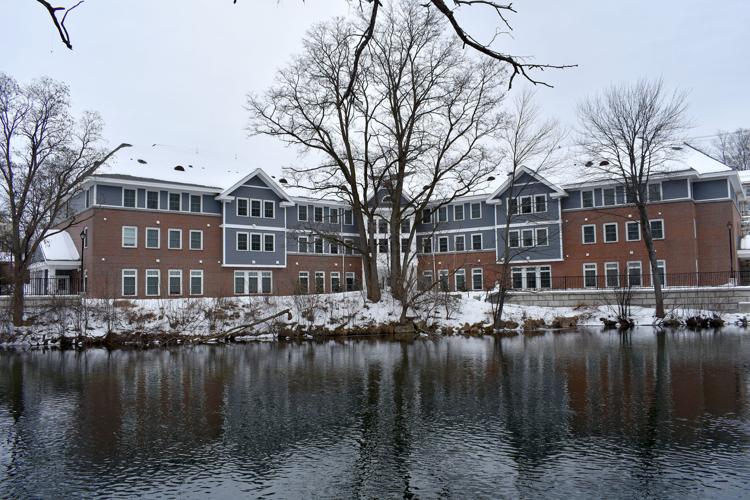LACONIA — The Zoning Board of Adjustment on Tuesday night refused to consider a proposal for what has become something of a rarity in the city — a project to create a significant number of market-rate apartments.
Jason Ganong, a real estate agent, sought approval from the board to turn the old Lakes Region Mental Health Center building downtown into a 20-unit apartment house.
The problem is Ganong doesn’t own the building, no longer has a contract to buy it, and, in fact, somebody else has it under contract.
Board chairman Steven Bogert said Ganong could seek approval from the panel next month if he provides written confirmation that the property owner has no objection.
“My intent with this would be really to increase the average quality of the apartments available in the Laconia area,” Ganong told the board. “As many of you probably know, the city does tend to struggle with offering quality residential properties available to individuals who want to have a high-quality residence.
“I think I could renovate it such that it would really be able to offer nice units to young professionals that want to help make Laconia thrive again. By offering more quality apartments in the Laconia area, we could improve the amount of business local shops and restaurants experience.”
Lakes Region Mental Health spokeswoman Ann Nichols said Wednesday the organization has no problem with Ganong seeking this approval.
A different buyer – whom LRMH declined to identify – has entered into an agreement to purchase the property from the mental health agency. This buyer’s future plans for the 13,850-square-foot, two-story property at 111 Church St., are not clear.
Unusual project
Planning Director Dean Trefethen said people occasionally seek approval for one or two new apartment units in an existing building, but proposals like Ganong's are infrequent.
The city saw its first major market-rate apartment projects in more than three decades with the opening of 48-unit Apple Ridge on Provencal Road and the 30-unit Perley Canal Mill buildiing at Beacon Street West in 2016. Leasing agents say all units in both buildings are currently rented.
Prices at Perley Canal range from $875 for a studio to $1,895 for the most expensive two-bedroom unit. Apple Ridge, near Lakes Region Community College, offers one-, two- and three-bedroom units, with prices ranging from $1,085 to $1,340.
“The city has gone through a period of time in which there has not been a lot of movement in that kind of product,” Trefethen said. “Anecdotally, the housing stock is not what it should be and not what consumers want it to be.”
Few vacancies
The New Hampshire Housing Finance Authority says the vacancy rate in Belknap County is 4 percent and the median monthly rent for a 2-bedroom apartment is $1,071. It estimates that a yearly household income of $47,100 would be required to afford such an apartment. The national vacancy rate is about 7 percent and median rent is about $1,000, according to the U.S. Census Bureau.
There are waiting lists for government-subsidized housing.
Richard Weaver, executive director of Laconia Housing, said his agency owns and manages 300 units of income-restricted housing. It also administers a program under which 407 people are given vouchers to help pay for private apartments.
The Housing Choice Voucher Program, which used to be called Section 8, has a waiting list that can range from 12 to 24 months. The apartment units the agency manages have waiting lists of three months to a year.
Quality units
Carmen Lorentz, executive director of Lakes Region Community Developers, which owns and operates 365 income-restricted housing units, said demand far exceeds the supply of quality apartments.
“We turn people away all the time who are over the income limit,” she said. “Of the quality of apartment we offer, there’s not a lot availability if you are not classified as a low-income family.”
Sheri Minor, a landlord with 60 units in the area, said she finds it difficult to compete with agencies that provide government-supported housing.
“We just had a lady leave our apartment here,” she said. “My rents are extremely low, but I can’t compete with big beautiful apartments with a water view.”
A view of the Winnipesaukee River is available from the 32-unit River’s Edge affordable housing project opened in August 2016 by Lakes Region Community Developers.
“We take care of our property, but my buildings are not in ideal areas,” Minor said. “With subsidized apartments, they go in and make it immaculate, amazing and beautiful. I can’t do that.”
She said she hears a lot about a lack of affordable apartments in the area, but she thinks many of those having trouble finding housing won’t be accepted by new landlords because they haven’t paid rent on time at previous apartments or they have left major damage.
Rooming house
Attorney Mike Persson appeared before the Zoning Board of Adjustment recently on behalf of a client proposing a rooming house to serve people seeking low-cost housing.
The board rejected the proposal out of concern that police calls associated with the building would put an undue burden on the city. Police Chief Matt Canfield later said rooming houses do not pose a particular problem for police.
At the time the board rejected the proposal, board member Suzanne Perley said the city was "maxed out on our affordable housing."
Persson questioned whether it was appropriate to reject a project based on a perception that it might attract police calls, but he also says Laconia has taken an active role in providing affordable housing.
"Surrounding towns need to step up and allow affordable housing to be built," he said. "Laconia has a much higher percentage of low-income housing than surrounding towns like Gilford, Meredith and Sanbornton. Those towns aren't in step. People need to have a place to live. Laconia is doing its part. It would be nice if surrounding towns did as well."
Workforce housing
State officials say business growth is being hindered by a lack of places for new employees to reside.
Wildolfo Arvelo, director of the state Department of Business and Economic Affairs, said affordable housing is the key to recruiting young workers at a time when unemployment rates are at historic lows.
“There just isn’t enough housing for our college graduates and seasonal workers looking to rent, or for young families ready to commit to a career, while balancing expenses and tuition loan payments,” he said in the state’s November Housing Market Report.
“More than meeting the needs of the thousands of businesses in the state, young workers add to the vibrancy of our communities.”



















(0) comments
Welcome to the discussion.
Log In
Keep it Clean. Please avoid obscene, vulgar, lewd, racist or sexually-oriented language.
PLEASE TURN OFF YOUR CAPS LOCK.
Don't Threaten. Threats of harming another person will not be tolerated.
Be Truthful. Don't knowingly lie about anyone or anything.
Be Nice. No racism, sexism or any sort of -ism that is degrading to another person.
Be Proactive. Use the 'Report' link on each comment to let us know of abusive posts.
Share with Us. We'd love to hear eyewitness accounts, the history behind an article.